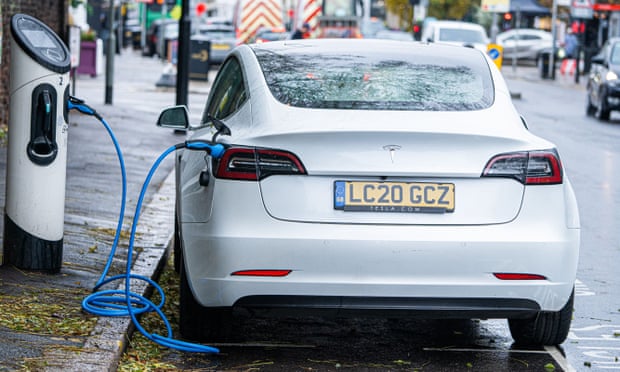11 Dec 2024

Tired Earth
By The Editorial Board

The carbon dioxide emissions of new cars sold in the UK dropped to the lowest level ever in 2021 thanks to the unprecedented surge in electric vehicle sales, industry data suggests.
Average new car CO2 emissions fell by 11.2%, to 119.7g for every kilometre driven, according to the Society of Motor Manufacturers and Traders (SMMT), a lobby group.
Battery electric vehicles accounted for only 12% of UK sales during 2021, but they rapidly drag down the figures because they produce zero exhaust emissions. Increased sales of hybrids, which include a battery alongside an internal combustion engine, also contributed to the fall in emissions, which was previously stymied in recent years by the rise of sales in higher-emission sports utility vehicles (SUVs).
In 2021, the SMMT reported a 38% drop in average new car emissions since 2000, although those data were produced under a different test methodology so are not directly comparable.
Car sales data for January, also published on Friday, showed that the number of battery electric cars more than doubled year on year to 14,400, accounting for 12.5% of cars sold.
Total new car sales rose by 27.5% year on year in January, although that was compared with January 2021 when the UK was in a strict lockdown and car showrooms were closed. The industry reported that sales were still limited by the months-long shortage of computer chips that has forced carmakers to favour key vehicles, including electric cars – which are vital for meeting emissions legislation.
Mike Hawes, the SMMT’s chief executive, said: “Once again it is electrified vehicles that are driving the growth, despite the ongoing headwinds of chip shortages, rising inflation and the cost-of-living squeeze.
“[This year] is off to a reasonable start, however, and with around 50 new electrified models due for release this year, customers will have an ever greater choice, which can only be good for our shared environmental ambitions.”
Sales of electric cars are expected to rise further during 2022, but it will probably still be several years before electric cars make a serious dent in total UK transport emissions. SMMT data published in May showed that battery electric vehicles and plug-in hybrids made up only 1.3% of the 40.35m cars on UK roads. In 2019, road transport accounted for 25% of the UK’s carbon dioxide emissions, according to government data.
Ben Nelmes, the head of policy and research at the thinktank New AutoMotive, said: “Electric car sales have doubled in the last year, but there is still a mountain to climb to reduce the UK’s carbon emissions from cars. The 90,000 internal combustion engines that rolled off forecourts this month will continue to pollute and hit motorists in their pockets for another 14 years, on average.”
The SMMT said that sales of electric cars are still limited by the perceived lack of charge points. Government data showed there were 28,400 public charge points available across the UK on 1 January, but the lobby group has previously said the country may need four or five times that amount.
The emissions data came as MPs on the transport select committee said that the move to electric cars meant the government should urgently work on plans for road pricing, under which drivers would pay by the mile. The government rakes in about £28bn a year in fuel duty paid on petrol and diesel, a tax that does not affect electric car drivers.
There is “no viable alternative” to road pricing to fill the gap in the budget, the MPs wrote in their report.
Source : theguardian.com
Comment